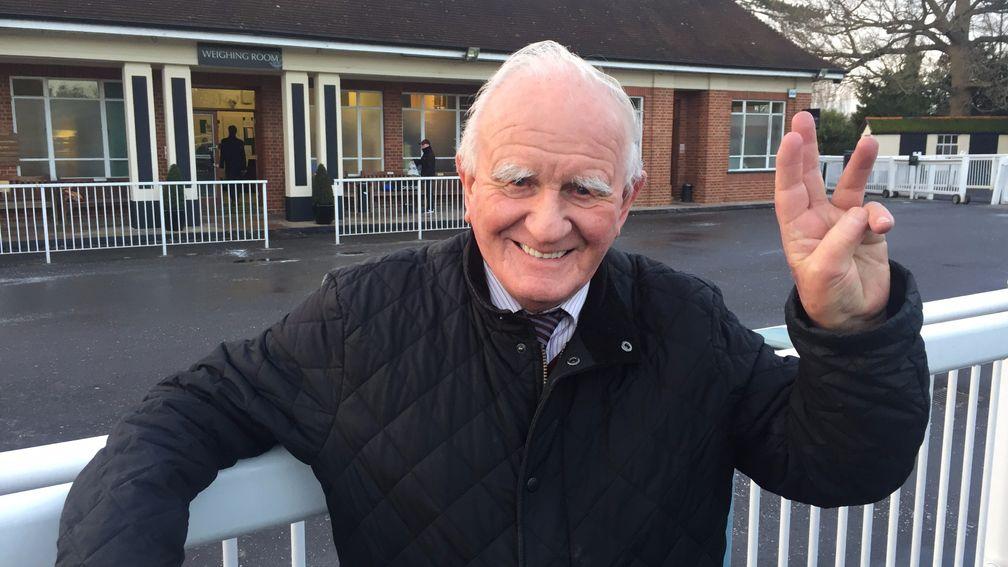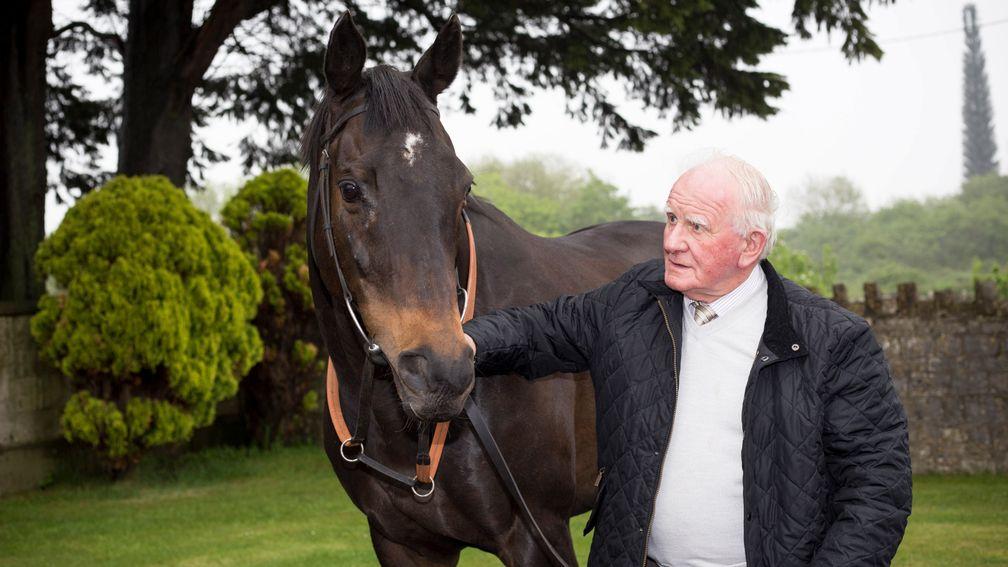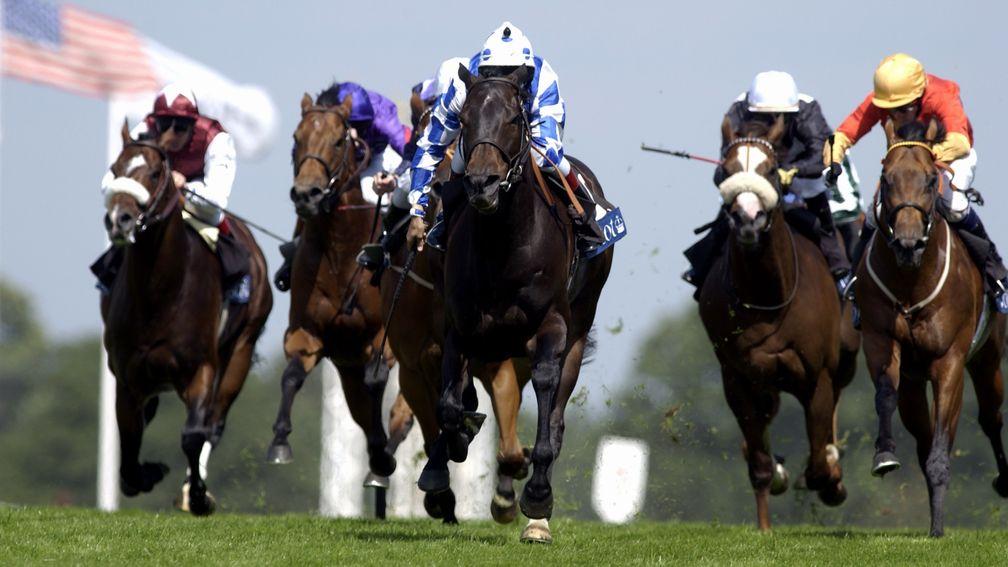'It's down to being a good stockman, knowing horses, and when they look right'

Ardent anthropomorphists who tell you that animals take after their owners will take heart from the tale of The Tatling, who couldn't have been more like his trainer Milton Bradley if he'd spoken in a Gloucestershire burr and held a training licence for more than 50 years.
In fact, although both had other partners in racing, it would be fair to say that each made the other's career and they passed as a pair into turf folklore through a partnership that lasted, one way and another, for 15 years.
The Tatling died at the age of 20, but not before he had won the 2004 King's Stand Stakes for Bradley's over-performing yard at Sedbury, near Chepstow, going on to run 176 times amid his abject refusal to be put out to grass.
"We tried to retire him a couple of years ago," the trainer once said, "but he absolutely hated it. We had a lovely paddock for him, and a pony for a companion, but every day he was there by the gate, hanging about and wanting to come in and be part of what was going on."
It might just as easily have been horse talking about trainer as trainer talking about horse. Both stayed the course strongly after unlikely beginnings – The Tatling cost a mere £15,000 out of a Catterick claimer and Bradley began his sporting life as a ten-time county champion in ploughing – and neither could be persuaded to call it a day, even when their best days were supposed to be receding into the past.
The son of Perugino ran in and won his last race, a Wolverhampton Class 6 handicap, at the age of 14; the son of John Bradley saddled a 1,121-1 treble at Lingfield in December 2017, little more than three years before retiring at the age of 86. You couldn't keep either of them down for long.

Milton Bradley was born John Milton Bradley in January 1935 – "probably named after Milton the poet, or Milton the toilet cleaner", he was never quite sure – but his mother insisted on him being known as Milton to avoid the confusion of having two John Bradleys in the house.
From the age of 12, he was ploughing to a high standard, at county level for Monmouthshire and losing out only narrowly to the reigning world champion in the World Match Championships. As time went on, however, he started riding and then training horses in the furiously competitive world of the 'flapping' tracks, where he learned the lifelong knack of ensuring a horse carried only as much weight in a race as it absolutely needed to.
Despite travelling as far afield as Scotland, however, he never left these islands until such time as he had to take out his first passport to accompany The Tatling to France for his attempt on the 2003 Prix de l'Abbaye, in which he finished third to Patavellian. If it can be classed as a holiday, this was Bradley's first in 51 years, which is perhaps testament to the all-consuming nature of life at racing's coal face.
Not that the man who trained a career total of 1,037 winners spent all his time grafting around the gaff tracks. Once he had shaken off the stigma of his time on the flapping circuit and been granted a permit by the Jockey Club, he started out training jumpers at Meads Farm stables – the most prolific being Grey Dolphin, who won ten races in 1983-84 – but then moved on to the less injurious world of the Flat, where he built up his string to a peak of 90 horses, many of them inexpensive sprinters.
While they may have been bought out of the bargain basement, they frequently outran their price tags. It wasn't just The Tatling, who won almost £700,000 in total. There was also Offa's Mead, who cost £100, started out winning a Beverley seller and graduated to annexing the Bovis Handicap at Ascot in 1978, and Brevity, a £3,500 purchase who scored eight times in 2001.
"It's down to a lot of skill, being a good stockman, knowing horses, and when they look right," was how Bradley boiled down the knack of finding and training decent performers, and he was proud to tell people he had never paid more than £25,000 for a horse, preferring to spot diamonds in the rough and make the most of them.
The Tatling, for example, had started his racing life with Michael Bell in Newmarket, winning twice and rising to a mark of 106 before having a year off and moving to David Nicholls in North Yorkshire, where he slid to a mark of 87 and was claimed on behalf of a trainer who clearly saw reasons to believe he might be restored to former glories.

"I don't try and buy trouble," he once said of his penchant for improving other people's cast-offs, and The Tatling was anything but trouble, proving his soundness in a career that lasted for another nine years and 154 races, during which time he supplemented his King's Stand win – sadly it was only a Group 2 at the time – by landing the then Group 3 King George Stakes and two World Trophys in the same grade, as well as hitting the crossbar in four Group 1s.
None as good as him ever came along – "he's one of those horses that you drop on by mistake and spend the rest of your life looking for another half as good," Bradley explained – but there were plenty of prolific and profitable ones, not least Nineacres, who won ten times in 2000, never beyond six furlongs, and Eastern Trumpeter, who won nine that same year, all over five, unsurprisingly.
It wasn't that he couldn't train anything other than sprinters, but it was sprinters he liked most, for logical reasons.
"I like speed horses more than I do stayers," he once elaborated, "primarily because they're cheaper to buy – no competition from Godolphin or Coolmore – and once you have them up and ready you can run them again and again."
He was no believer, either, in gambling large sums at auction, saying: "At the yearling sales they want £50,000 for a very moderate one. Only about one in ten wins and I'd rather have a bigger chance than that.
"I like to buy horses who have shown a bit of form but not actually won as the handicappers have them taped. I'm not into wasting owners' money. I get a lot more of a kick out of buying a horse for 10k than someone sticking their chest out for £30,000."
It was a policy based on frugality and stockman's common sense, and he made it work at a yard where his wife Ruth, he acknowledged, was the backbone of the operation, and where he and his family farmed around 450 acres, in case running a racing stable didn't keep him busy enough.
Bradley once bagged 70 winners in a campaign on the Flat (although never more than 20 over jumps), trained more winners than he had horses in 2001 and generally outperformed his odds for five decades before age and a sense of disillusionment with prize-money gradually slowed him down.
By the time he retired, he was down to ten horses who went to his granddaughter Hayley and her husband, trainer Charlie Wallis, in Essex.
"I couldn't see any future in asking people to buy horses," he said, but although he gave up training, it's unlikely he ever stopped being busy – three children, ten grandchildren and four great grandchildren would have seen to that. Not that staying active was something he fought shy of.
"You die when you retire," he once said. "Don't rest out, wear out."
It was a motto he lived up to wholeheartedly through six decades in racing.
Read more:
'He was different class' - training stalwart Milton Bradley dies at age of 88
Published on inNews
Last updated
- Join Racing Post Members' Club for the very best in racing journalism - including Patrick Mullins' unmissable trip to see Gordon Elliott
- Join the same team as Ryan Moore, Harry Cobden and other top jockeys with 50% off Racing Post Members' Club
- Racing Post Members' Club: 50% off your first three months
- 'It’s really exciting we can connect Wentworth's story to Stubbs' - last chance to catch master painter's homecoming
- The jumps season is getting into full swing - and now is the perfect time to join Racing Post Members' Club with 50% off
- Join Racing Post Members' Club for the very best in racing journalism - including Patrick Mullins' unmissable trip to see Gordon Elliott
- Join the same team as Ryan Moore, Harry Cobden and other top jockeys with 50% off Racing Post Members' Club
- Racing Post Members' Club: 50% off your first three months
- 'It’s really exciting we can connect Wentworth's story to Stubbs' - last chance to catch master painter's homecoming
- The jumps season is getting into full swing - and now is the perfect time to join Racing Post Members' Club with 50% off